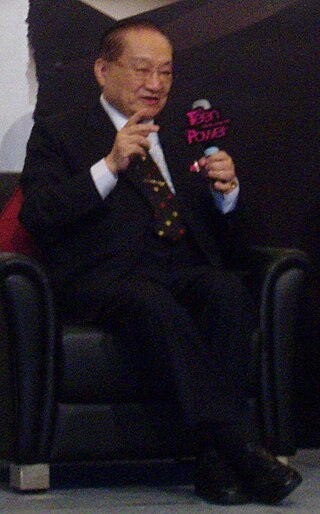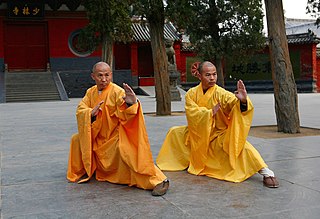Related Research Articles

Zhang Sanfeng refers to a legendary Chinese Taoist who many believe invented T'ai chi ch'üan. However,other sources point to early versions of Tai Chi predating Sanfeng. He was purported to have achieved immortality.

Louis Cha Leung-yung,better known by his pen name Jin Yong,pronounced "Gum Yoong" in Cantonese,was a Chinese wuxia novelist and essayist who co-founded the Hong Kong daily newspaper Ming Pao in 1959 and served as its first editor-in-chief. He was Hong Kong's most famous writer,and is named along with Gu Long and Liang Yusheng as the "Three Legs of the Tripod of Wuxia".

The Wudang Mountains consist of a mountain range in the northwestern part of Hubei,China,just south of Shiyan. They are home to a famous complex of Taoist temples and monasteries associated with the Lord of the North,Xuantian Shangdi. The Wudang Mountains are renowned for the practice of Tai chi and Taoism as the Taoist counterpart to the Shaolin Monastery,which is affiliated with Chinese Chán Buddhism. The Wudang Mountains are one of the "Four Sacred Mountains of Taoism" in China,an important destination for Taoist pilgrimages. The monasteries such as the Wudang Garden were made a UNESCO World Heritage Site in 1994 because of their religious significance and architectural achievement.
Zhang Wuji is the fictional protagonist of the wuxia novel The Heaven Sword and Dragon Saber by Jin Yong.

The Heaven Sword and Dragon Saber,also translated as The Sword and the Knife,is a wuxia novel by Jin Yong and the third part of the Condor Trilogy,preceded by The Legend of the Condor Heroes and The Return of the Condor Heroes. It was first serialised from 6 July 1961 to 2 September 1963 in the Hong Kong newspaper Ming Pao.
The Ming Cult is a fictional cult and martial arts sect featured in the wuxia novel The Heaven Sword and Dragon Saber by Jin Yong,first published in serial form from 1961 to 1963. It is also briefly mentioned in The Legend of the Condor Heroes,another novel also by Jin Yong. It is loosely based on Manichaeism,an actual gnostic religion which originated in Persia in the 3rd century CE and later spread to other parts of the world,including China. The cult's headquarters is at Bright Peak in the Kunlun Mountains and it has several other bases spread throughout China. Its most powerful skills are the "Heaven and Earth Great Shift" and the "Martial Arts of the Holy Flame Tablets".
Chen Wentong,better known by his pen name Liang Yusheng,was a Chinese writer. Credited as the pioneer of the "New School" (新派) of the wuxia genre in the 20th century,Chen was one of the best known wuxia writers in the later half of the century,alongside Jin Yong and Gu Long.
The Jiuyang Zhenjing,also known as the Nine Yang Manual,is a fictional martial arts manual in Jin Yong's Condor Trilogy. It was first introduced briefly at the end of the second novel The Return of the Condor Heroes. It plays a significant role in the third novel The Heaven Sword and Dragon Saber after Zhang Wuji discovers it and masters the skills in the book.
Baifa MonüZhuan is a wuxia novel by Liang Yusheng. It was serialised between 5 August 1957 and 10 December 1958 in the Hong Kong newspaper Sin Wun Pao. It is closely related to Qijian Xia Tianshan and Saiwai Qixia Zhuan. The novel has been loosely adapted into films and television series,such as The Bride with White Hair (1993) and The Romance of the White Hair Maiden (1995),and The White Haired Witch of Lunar Kingdom (2014).
The Shaolin School is a fictional martial arts school mentioned in several works of wuxia fiction. It is one of the largest and best known orthodox schools in the wulin. Its base is in Shaolin Monastery,Henan,China. It is also sometimes referred to as "Shaolin Monastery" or "Shaolin Temple" instead of "Shaolin School".

Chen Wangting (1580–1660),courtesy name Zouting (奏廷),was a Ming dynasty officer who founded Chen-style t'ai chi ch'uan,one of the five major styles of the popular Chinese martial art. Sometimes called Chen Wang Ting,he devised the Chen family-style of t'ai chi ch'uan in his home of Chenjiagou,Wenxian county,Henan province after he retired there following the fall of the Ming dynasty.
The Emei School is a fictional martial arts school mentioned in several works of wuxia fiction. It is commonly featured as one of the leading orthodox schools in the wulin. It is named after the place where it is based,Mount Emei.
The Kunlun School is a fictional martial arts school mentioned in several works of wuxia fiction. It is usually featured as a leading orthodox school in the wulin. It is named after the place where it is based,the Kunlun Mountains in western China,near modern Qinghai and Xinjiang provinces. Due to its geographical location,it was hardly known to martial artists in the jianghu before its rise to prominence.
The Mount Hua School,also known as the Huashan School,is a fictional martial arts school mentioned in several works of wuxia fiction. It is commonly featured as one of the leading orthodox schools in the wulin. It is named after the place where it is based,Mount Hua. The school appears in three of Jin Yong's novels.
The Kongtong School is a martial arts school mentioned in several works of wuxia fiction. It is commonly featured as a leading orthodox school in the wulin. It is named after the place where it is based,the Kongtong Mountains.
The Mount Heaven Sect,also known as the Tianshan Sect,is a fictional martial arts sect mentioned in works of wuxia fiction,most notably Liang Yusheng's Qijian Xia Tianshan. It also appears in Jin Yong's Demi-Gods and Semi-Devils as a minor sect that plays an important role in the story line of one of the three protagonists,Xuzhu. The sect is named after the place where it is based,the Tian Shan mountain range in western China.

Kung Fu Cult Master is a 1993 Hong Kong wuxia film adapted from Louis Cha's novel The Heaven Sword and Dragon Saber. Directed by Wong Jing,it featured fight choreography by Sammo Hung,and starred Jet Li,Sharla Cheung,Chingmy Yau and Gigi Lai in the lead roles.

Romance of the White Haired Maiden is a 1999 Taiwanese television series adapted from the wuxia novel Baifa MonüZhuan by Liang Yusheng. Alternative Chinese titles for the series include Yidai Xianü (一代俠女) and Baifa Xianü (白髮俠女).

Wudang quan is a class of Chinese martial arts. In contemporary China,Chinese martial arts styles are generally classified into two major groups:Wudang (Wutang),named after the Wudang Mountains;and Shaolin,named after the Shaolin Monastery. Whereas Shaolin includes many martial art styles,Wudangquan includes only a few arts that use the focused mind to control the body. This typically encompasses taijiquan,xingyiquan and baguazhang,but must also include Baji chuan and Wudang Sword. Although the name Wudang simply distinguishes the skills,theories and applications of the internal arts from those of the Shaolin styles,it misleadingly suggests these arts originated at the Wudang Mountains. The name Wudang comes from a popular Chinese legend that incorrectly purports the genesis of taijiquan and Wudang Sword by an immortal,Taoist hermit named Zhang Sanfeng who lived in the monasteries of Wudang Mountain.